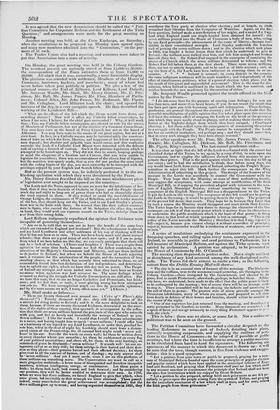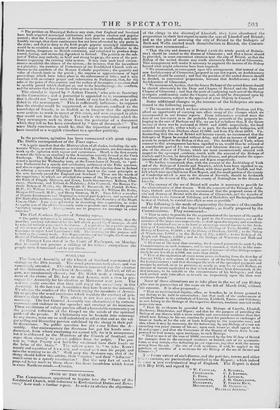The Petition Committee have forwarded a circular despatch to the
leading Reformers in every . part of Ireland, detailing their plans, earnestly requesting cooperation, and supplying the outlines of peti- tions to the House of Commons—to be adopted if possible at public meetings, but where the time is insufficient to arrange a public meeting. to be circulated from hand to hand for signatures. The following are specimens of the manner in which this document is drawn up : it will be seen that the tone, though earnest, is free from violence and exagge- ration : this is a good symptom. " Let a petition from your town or parish be prepared, praying for a mea- sure of Municipal Reform founded upon the same principles of popular c!ection and popular control which have been applied in the municipal reforms of Eng- land and Scotland, and praying that Parliament shall pass no law which shall in any manner sanction or countenance the principle that Ireland shall not have the same free institutions which are enjoyed by Great Britain.
" Let a petition be also prepared, setting forth such grievances as are felt pe- culiarly to press upon the people arising born the system of Tithes, and praying for the immediate enactment of a law which shall at once, and for ever, relieve
the Irish people from those grievances." • • •
" The petition on Municipal Reform may state, that England and Scotland have both acquired municipal institutions, with popular election and inpular control ; that the Corporations of Ireland have been so confessedly and inde- fensibly corrupt, that their continuance has not been advocated by any party in the state; and that to deny to the Irish people popular municipal institutions, would be to establish a maxim of state policy unjust in itself, offensive to the Irish nation, dangerous to Bt itish connexion, and calculated to produce deep- rooted, lasting, and increasing discontent in Ireland. The petition on the sub- ject of Tithes may embody, in brief and strong lam gu tge, the sense of the peti- tioners respecting the existing tithe system. It may state such local circum- stances as exhibit the abuses of the system,—for instance, that the incumbent is a pluralist ; the numbers of Protestants of the Established Church with re- ference to the numbers of the Roman Catholic population ; the quantity and value of church. lands in the parish ; the expense or oppressiveness of legal proceedings which have taken place in the enforcement of tithe; and it may conclude with an earnest prayer and exhortation to Parliament, that, for the sake of the peace of this country and the welfare of the empire, a meamure shall be speedily passed which shall put an end to the heattburnings, tide conflicts, and the miseries that flow from the tithe system in Ireland."
This circular is signed by " Arthur French," who acts as Secretary to the Committee ; and a postscript is appended to it, recommending that it should not "pass into the hands of any but fr:eads, or be pub- lished in the newspapers." This is sufficiently ludicrous: to suppose that the circular could be suppressed, or its contents confined to the knowledge of friends, is as tbolish as to imagine that the agitators were anxious to work in secret at this crisis, and were engaged in plots that would not bear the light. Yet such is the conclusion which the Tory newspapers seek to draw from the postscript of a document which they tell us has been circulated by " tens of thousands ! " The more likely conclusion would be, that the injunction of secrecy had been inserted as a waggish stimulant to a speedier publicity.



























 Previous page
Previous page